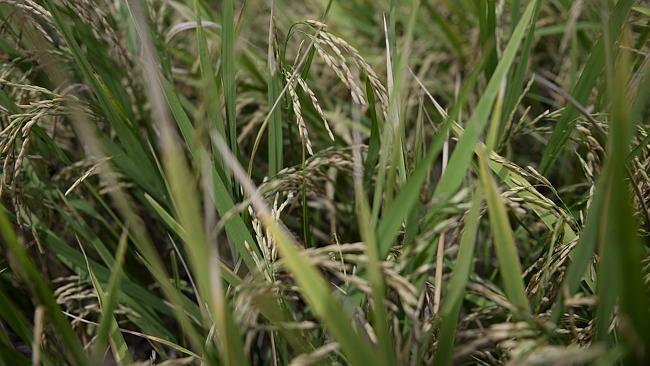
Rice grains before they’re harvested. Source: AFP
CARBS make you fat and gluten-free diets make you thin, right? Wrong, according to the Grains and Legumes Nutrition Council.
The Grains and Legumes Nutrition Council (GLNC) are an independent authority on the nutrition and health benefits of grains and legumes, and frankly, they’re tired of the bad rap their beloved produce is getting.
Most recently, ABC’s Catalyst program came under fire over pushing a controversial low carbohydrate diet endorsed by scientists who claim that the current food pyramid should be inverted and instead of eating carbohydrates like breads and cereals, we should eat more fat.
The diet, which cricketer Shane Watson credits for his weight loss, was challenged by experts because it did not warn that a low-carb diet could be bad for bowel health, could leave you with constipation and bad breath, and because the diet does not contain enough nutrients.

Should we be limiting grains? Source: Getty Images
Among those challenging the diet were the Heart Foundation, who “recommend maintaining a balance between fat (mostly unsaturated) and carbohydrate intakes,” and dietitian Rosemary Stanton, who helped write the current National Health and Medical Research Council dietary guidelines.
Those guidelines stipulate that “30 per cent of a healthy diet should be made up of carbohydrates like bread, wholegrains and legumes, 10 per cent of the diet should be made up of fruit, and fats should only be used in small amounts”.
But it’s our obsession with weight loss and dieting that sees us cutting out major food groups — especially grains.
“People are often spurred on to lose weight by the impending need to look good for a special occasion or be bikini ready for a beach holiday. It’s this urgency that finds them grasping at straws, looking for a quick fix,” agrees Accredited Practising Dietitian Michelle Broom.
More:Why we are more confused about what to eat than ever before

Everything in moderation. Source: Getty Images
“The truth is, individual testimonials often make dramatic claims and don’t end up delivering promised weight loss for others. By taking a sensible approach, you won’t just lose the weight but keep it off, too.
“Weight loss can be achieved without the fads, or succumbing to movements which encourage cutting whole food groups from your diet.”
As GLNC’s Nutrition Program Manager, Ms Broom’s expertise is grain foods and legumes, the nutrients they contain such as fibre, carbohydrates, vitamins and minerals — and the misconceptions that come with this food group.
Here are Michelle Broom’s five common diet myths to look out for:
MYTH ONE: Eliminating whole food groups is the key to weight loss.
FACT: The best thing for a healthy body is a balance of foods from all food groups. For weight loss, limiting foods that are high in calories but lack essential nutrients is important, and portion control is also key to sustainable weight loss.

Legumes in all their glory. Source: Getty Images
MYTH TWO: Carbohydrates make you fat.
FACT: Quality grain foods such as whole grain bread and high fibre breakfast cereals can help with weight management. These foods are linked with a smaller waistline and greater chance of being a healthy weight. In addition, if you’re hitting the gym to boost your weight loss, you need carbs in your diet. In fact, keeping grain foods in your weight loss diet will provide the nutrients to help your metabolism.
More: Do carbs at night make you fat?
MYTH THREE: A low-FODMAP diet is a healthy diet for all.
FACT: ‘FODMAP’ is an acronym referring to Fermentable Oligosaccharides, Disaccharides, Monosaccharides and Polyols — complex names for a collection of fibres and sugars found in the foods we eat such as rye, wheat and milk as well as some fruit and vegetables such as snap peas and apples. A low-FODMAP diet is not for the long term. It is designed as a short term (2-6 weeks) therapeutic elimination diet, often used to control Irritable Bowel Syndrome and other gut-related issues. It requires the supervision and support of an experienced Accredited Practising Dietitian and is not for the general population. Research shows these fibres may actually promote the growth of good bugs in the gut so it is important that people don’t cut these nutritious foods out of their diet completely.

Unless you have coeliac disease, a gluten free diet provides no nutritional or health benefit. Source: Getty Images
MYTH FOUR: A low carb, high fat (LCHF) diet is the secret to slimming.
FACT: LCHF diets are not a more effective way of keeping weight off long term. LCHF diets are yet to be proven to provide adequate nutrition, be sustainable and prevent disease across the lifespan. In fact, LCHF diets represent a radically different eating pattern to the foods shown by an analysis of the whole scientific evidence base. Diets such as LCHF that restrict fibre and nutrient rich carbohydrate foods have been linked with a 30 per cent increased risk of early death.
MYTH FIVE: A gluten free diet will make you thin.
FACT: Many gluten free foods contain more calories than gluten containing foods as they often contain higher amounts of fat and sugar to make them taste better. Gluten free products are often made with ingredients such as potato starch or tapioca flour, resulting in products lower in fibre and whole grain which are important for digestion and metabolism. Unless medically diagnosed with coeliac disease or gluten intolerance, a gluten free diet provides no nutritional or health benefit to individuals.
More: Is wheat wicked?
Originally published as Five diet myths completely busted
